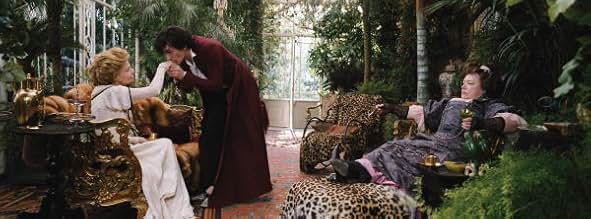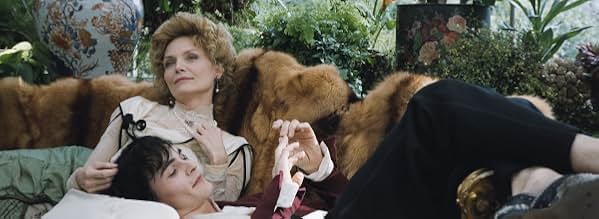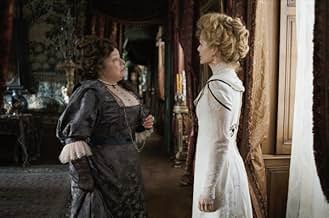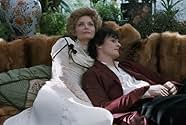VALUTAZIONE IMDb
6,1/10
11.957
LA TUA VALUTAZIONE
Il figlio di una cortigiana si ritira in un mondo di fantasia dopo essere stato costretto a porre fine alla sua relazione con la donna più anziana che lo ha educato alle vie dell'amore.Il figlio di una cortigiana si ritira in un mondo di fantasia dopo essere stato costretto a porre fine alla sua relazione con la donna più anziana che lo ha educato alle vie dell'amore.Il figlio di una cortigiana si ritira in un mondo di fantasia dopo essere stato costretto a porre fine alla sua relazione con la donna più anziana che lo ha educato alle vie dell'amore.
- Regia
- Sceneggiatura
- Star
- Premi
- 3 vittorie e 2 candidature totali
Recensioni in evidenza
After you get over how beautiful the lighting makes 51 year old Michelle Pfeiffer playing her age and how old it makes 28 year old Rupert Friend playing 19, there's not much else to love about Cheri. Or maybe you can love the sumptuous 19th century Paris estates, cars, and gowns of the idle rich, whose lives will morph into something less glamorous as the Belle Epoque slides into WWI.
Colette's two novels about Chéri (Friend) the son of wealthy courtesan Madame Peloux (Kathy Bates), are not just about an indolent but beautiful rich slacker; they also follow the good fortune of Lea de Lonval (Pfeiffer), an unusually beautiful and profitable courtesan who has shrewdly prepared herself for financial comfort but forget the cardinal rule of prostitutes: Don't fall in love.
After six years of lover's paradise, Chéri and Lea part as the takes an arranged bride. And that's all there is, folks, as the film moves from a robust ramble about the various courtesans to a dreary hour of Twilight-like longing between this old-fashioned Harold and Maude. Director Steven Frears, who has had a fair share of intriguing films and characters, just lets the camera make love to Pfeiffer and Friend without fleshing out the characters to let is know what is so lovable to be longing for so long. Writer Christopher Hampton with Dangerous Liaisons and Atonement on his resume can't seem to muster a memorable line or develop his characters from flat clichés into round characters.
I do concede that Kathy Bates delivering this line saved the film for the moment: "Don't you find that when the skin is a little less firm, it holds perfume so much better?" Said to Michelle Pfeiffer, these lines give Bates bite of the year honors and a brief respite from spare, meaningless dialogue.
Colette's two novels about Chéri (Friend) the son of wealthy courtesan Madame Peloux (Kathy Bates), are not just about an indolent but beautiful rich slacker; they also follow the good fortune of Lea de Lonval (Pfeiffer), an unusually beautiful and profitable courtesan who has shrewdly prepared herself for financial comfort but forget the cardinal rule of prostitutes: Don't fall in love.
After six years of lover's paradise, Chéri and Lea part as the takes an arranged bride. And that's all there is, folks, as the film moves from a robust ramble about the various courtesans to a dreary hour of Twilight-like longing between this old-fashioned Harold and Maude. Director Steven Frears, who has had a fair share of intriguing films and characters, just lets the camera make love to Pfeiffer and Friend without fleshing out the characters to let is know what is so lovable to be longing for so long. Writer Christopher Hampton with Dangerous Liaisons and Atonement on his resume can't seem to muster a memorable line or develop his characters from flat clichés into round characters.
I do concede that Kathy Bates delivering this line saved the film for the moment: "Don't you find that when the skin is a little less firm, it holds perfume so much better?" Said to Michelle Pfeiffer, these lines give Bates bite of the year honors and a brief respite from spare, meaningless dialogue.
My feelings about this film swung between two competing schools of thought as I watched it.
One - do I feel any attachment and engagement in this story of Belle Epoque Paris where an extremely wealthy courtesan falls in love with the son of an extremely wealthy courtesan, a young man with apparently few redeeming features to his character ?
and
Two - This is a very well made and acted film - Michelle Pfeiffer is excellent, drawing me into the feelings of her character as the film progressed and Rupert Friend makes much of a role that I'm sure other young actors would have found too complex
In the end I settled closer to thought number two - this is a film with much to say about love and who we fall in love with.
I was fortunate to attend a screening of this film at which both the writer - Christopher Hampton & director Stephen Frears were present and enjoyed listening to them talk about the film, it's development and their hopes for it. Two very engaging characters who proved to be happy to answer all kinds of questions that we the Nottingham audience could throw at them
One - do I feel any attachment and engagement in this story of Belle Epoque Paris where an extremely wealthy courtesan falls in love with the son of an extremely wealthy courtesan, a young man with apparently few redeeming features to his character ?
and
Two - This is a very well made and acted film - Michelle Pfeiffer is excellent, drawing me into the feelings of her character as the film progressed and Rupert Friend makes much of a role that I'm sure other young actors would have found too complex
In the end I settled closer to thought number two - this is a film with much to say about love and who we fall in love with.
I was fortunate to attend a screening of this film at which both the writer - Christopher Hampton & director Stephen Frears were present and enjoyed listening to them talk about the film, it's development and their hopes for it. Two very engaging characters who proved to be happy to answer all kinds of questions that we the Nottingham audience could throw at them
One of the delights of this film is the lushness and perfection of the sets and costumes of the Belle Époque (c. 1890-1914). The sets and costumes are so gorgeous they threaten to overwhelm the actors. Threaten, but don't succeed. Michelle Pfeiffer is sensual and beautiful as the aging courtesan Lea—a woman approaching a "certain age," as the narrator (Stephen Frears) informs us. Lea has known the love and admiration of the wealthiest men in Europe, many of them titled. She has been wise to keep her heart out of her affairs. Then Fred, ("Cheri") the son of another courtesan (Kathy Bates) enters Lea's life, and she finds herself caring for the aimless but charming young man more than she should.
Kathy Bates is wonderful as Madame Peloux, a former competitor of Lea's—a woman who, if you squint hard (and catch the "portrait" of a younger Peloux) you can imagine having a gamine charm years before. Bates' acting moves effortlessly from laughing delightedly at smutty gossip to quickly assuming the pouting self-righteous expression of a disapproving mama as she discusses her son. From former courtesan to bourgeois matron in the blink of an eye. Bates carries this quick switch act off several times in the movie, and it's a pleasure to watch her skill at these rapid changes. The sets and costumes of Mme. Peloux, heavy 2nd Empire furnishings, stiff wired dressed with bustles, are beautifully contrasted with Lea's lighter look—slender, graceful, light. The clothes each character wears, and the styles of their respective homes, gives some subtext to the story. Mme. Peloux, a bit older than Lea, had her taste formed in an era of overdone stuffy pretentiousness, while Lea, a bit younger, has embraced the airy beauty of Art Nouveau.
The stultifying life of aging and former courtesans is well-depicted—unwelcome in respectable society they have to fall back on each other's company. Former competitors, they still can't help sniping at one another. Lea, as one of the youngest of the group, moves like a sylph among the faded charms of her cohort. One amazing scene: Among a bower of faded courtesans, one of them, a busty brassy red-head, cuddles and squeals like a teenager as she introduces her lover, a young man who's the son of one this woman's "official lovers." As she overwhelms the rather weedy young man with her caresses, the viewer can see Lea's discomfort—seeing the loud red-head and her boy lover seems like seeing a grotesque mockery of herself and Cheri.
Cheri, the title character, is played by Rupert Friend (Prince Albert in "The Young Victoria," and Mr. Wickham in the 2005 version of "Pride and Prejudice"). He's a young man who has only two responsibilities: marry, and manage the large amount of money his mother settles on him at his marriage. He's a young man without purpose, but finds love with Lea. What starts as a light-hearted affair turns into a relationship both Cheri and Lea need more than they realized. Lea and Cheri's affair ends—as does the wonderful era depicted in this gorgeous movie. The war ends Lea and Cheri's world. The 20th century starts with bleakness and hardness after the golden afternoon of La Belle Époque. We are indebted to Collette and Stephen Frears for showing us the loveliness, and even the artful decadence, of that time, and we are indebted to the talented cast for giving life to the "demi-monde" ("half-world") of that era.
Kathy Bates is wonderful as Madame Peloux, a former competitor of Lea's—a woman who, if you squint hard (and catch the "portrait" of a younger Peloux) you can imagine having a gamine charm years before. Bates' acting moves effortlessly from laughing delightedly at smutty gossip to quickly assuming the pouting self-righteous expression of a disapproving mama as she discusses her son. From former courtesan to bourgeois matron in the blink of an eye. Bates carries this quick switch act off several times in the movie, and it's a pleasure to watch her skill at these rapid changes. The sets and costumes of Mme. Peloux, heavy 2nd Empire furnishings, stiff wired dressed with bustles, are beautifully contrasted with Lea's lighter look—slender, graceful, light. The clothes each character wears, and the styles of their respective homes, gives some subtext to the story. Mme. Peloux, a bit older than Lea, had her taste formed in an era of overdone stuffy pretentiousness, while Lea, a bit younger, has embraced the airy beauty of Art Nouveau.
The stultifying life of aging and former courtesans is well-depicted—unwelcome in respectable society they have to fall back on each other's company. Former competitors, they still can't help sniping at one another. Lea, as one of the youngest of the group, moves like a sylph among the faded charms of her cohort. One amazing scene: Among a bower of faded courtesans, one of them, a busty brassy red-head, cuddles and squeals like a teenager as she introduces her lover, a young man who's the son of one this woman's "official lovers." As she overwhelms the rather weedy young man with her caresses, the viewer can see Lea's discomfort—seeing the loud red-head and her boy lover seems like seeing a grotesque mockery of herself and Cheri.
Cheri, the title character, is played by Rupert Friend (Prince Albert in "The Young Victoria," and Mr. Wickham in the 2005 version of "Pride and Prejudice"). He's a young man who has only two responsibilities: marry, and manage the large amount of money his mother settles on him at his marriage. He's a young man without purpose, but finds love with Lea. What starts as a light-hearted affair turns into a relationship both Cheri and Lea need more than they realized. Lea and Cheri's affair ends—as does the wonderful era depicted in this gorgeous movie. The war ends Lea and Cheri's world. The 20th century starts with bleakness and hardness after the golden afternoon of La Belle Époque. We are indebted to Collette and Stephen Frears for showing us the loveliness, and even the artful decadence, of that time, and we are indebted to the talented cast for giving life to the "demi-monde" ("half-world") of that era.
"Cheri" is the nickname given by Lea (Michelle Pfeiffer) to the young, much younger Fred, whom she brings to discover the truth about lovemaking, and unintentionally but inevitably, about loving. The actor playing Fred is handsome, attractive, but who really hits the sign (as usually, I would say) is Michelle Pfeiffer, who proved to be very courageous in playing a role where she constantly repeats to herself how old she is. Indeed, her beauty, elegance and refinement are always there to remind her and us how difficult it is to come to terms with ageing, mainly when beauty has been the very essence of your life.
The plot is almost absent, being the story more based on emotions, moods, sensations, rather than facts, and the movie in the end manages to capture the viewer, thanks to its capability to render the emotional side through glances and through effective and intense framing of both characters and situations: the last one is incisive, almost paralyzing.
Ironic and funny moments are not absent, mainly when Cathy Bates, playing the odd, high spirited mother, enters the scene, but the overall tone is a melancholic one, above all for the female public, we cannot but sympathize with Lea's inner strength, and at the same time feel moved by her deep suffering. From an aesthetic point of view, the movie is to be visually appreciated for its pleasant settings, its refined costumes and in general for a deep care for precious details.
The plot is almost absent, being the story more based on emotions, moods, sensations, rather than facts, and the movie in the end manages to capture the viewer, thanks to its capability to render the emotional side through glances and through effective and intense framing of both characters and situations: the last one is incisive, almost paralyzing.
Ironic and funny moments are not absent, mainly when Cathy Bates, playing the odd, high spirited mother, enters the scene, but the overall tone is a melancholic one, above all for the female public, we cannot but sympathize with Lea's inner strength, and at the same time feel moved by her deep suffering. From an aesthetic point of view, the movie is to be visually appreciated for its pleasant settings, its refined costumes and in general for a deep care for precious details.
Why is this movie rated as 6.2 out of 10? Are people blind? Crowds of movie goers flock to Avatar and Alice in Wonderland, and stuff like Cheri are completely overlooked. This is a delicious flick, with a great unusual and touching romantic story, gorgeous early 20th century atmosphere and brilliant interpretations from gorgeous Michele Pfeiffer and Kathy Bates. The story flows slow and stylishly like the surroundings of Belle Epoque and the final is so moving it makes a stone cry. Definitely the best movie I saw in 2009 together with Bright Star from Jane Campion. Please go see it and don't believe anyone who tells you otherwise.
Lo sapevi?
- QuizWhen the project was in development during the 1990s, Jessica Lange planned to star as Léa de Lonval.
- BlooperIn the closing credits, 'thanks' are given to France's national railway, the Societe National Chemin de Fer, known as the "SNCF". However the credits have the letters out of sequence, calling it the "SCNF".
- Citazioni
Lea de Lonval: I'm probably making a fool of myself... but then again, why not? Life is short!
- Versioni alternativeThere are five different versions. Runtimes are: "1h 40m(100 min), 1h 26m(86 min) (United States), 1h 32m(92 min) (United States), 1h 32m(92 min) (Argentina), 1h 40m(100 min) (Berlin International) (Germany)".
I più visti
Accedi per valutare e creare un elenco di titoli salvati per ottenere consigli personalizzati
- How long is Chéri?Powered by Alexa
Dettagli
Botteghino
- Budget
- 23.000.000 USD (previsto)
- Lordo Stati Uniti e Canada
- 2.715.657 USD
- Fine settimana di apertura Stati Uniti e Canada
- 405.701 USD
- 28 giu 2009
- Lordo in tutto il mondo
- 9.368.242 USD
- Tempo di esecuzione1 ora 40 minuti
- Colore
- Mix di suoni
- Proporzioni
- 2.35 : 1
Contribuisci a questa pagina
Suggerisci una modifica o aggiungi i contenuti mancanti





















